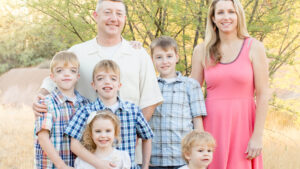
How much experience with IEPs does it take to consider someone an expert? If Cheryl Gilroy isn’t an expert yet, she’s certainly well on her way.
“I feel fortunate that my background as a special education teacher provided me with knowledge of the special education process and my rights. But, coming into IEP meetings as a parent– it’s very different.”
It was after her oldest son was diagnosed with autism at age three that Cheryl first started to experience IEPs as a parent. Cole, now in high school, has been attending a private school since sixth grade. Cheryl has found using Empowerment Scholarship Account funds allows Cole to attend a school that meets his unique needs.
Cheryl’s twins, Colin and Conor were born with craniosynostosis which caused the bones in their skulls to fuse together too early. Problems with their normal brain and skull growth led to global delays and other complications. Although Cheryl opted for a private school placement for Cole, her twins are finding success at the same charter school as her daughter who does not have an IEP.
Jacob, Cheryl’s youngest was adopted from foster care. He is deaf and has a cochlear implant.
Jacob’s IEP team from the Gilroy’s public school district has decided that the correct placement for him is at a private oral education school for children who are deaf or hard of hearing.
Once she left her teaching job, Cheryl began volunteering as a parent leader for Raising Special Kids. Her professional and personal experiences help her help other parents. “I love to be supportive and guide families on their own journey. My big thing is to educate families about all the options, services and resources that are available to them within the state.”
When it comes to IEPs specifically, Cheryl has a few tips:
- Identify your child’s strengths and challenges.
- Prepare. Read the IEP draft. Write down your concerns.
- You are part of the IEP team. Work with the team to meet your child’s needs.
- If you can, bring someone with you to the meeting to help keep you on track.
